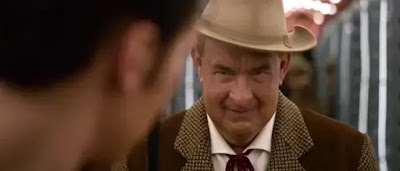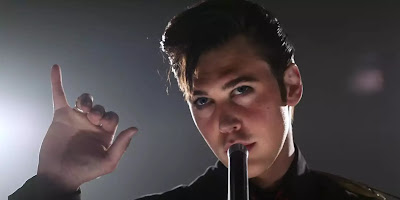Wednesday, June 29, 2022
Elvis (2022)
Sunday, June 26, 2022
Don't Make a Scene (Redux) The Black Stallion (1979)
This was a "Don't Make a Scene" from way, way back (when I first started doing the feature), and in looking at it, I thought it could be improved. The film edits didn't really match where I'd had them and the number of screen captures were spare (for me, anyway). So, I've tinkered with it, did a few adjustments, added some more pix. I'm happy with it now.

The Set-Up: "Tell Me a Story." All movies should be telling a story, but sometimes it may also feature a story in the midst of the narrative, embedded like a nesting doll. That story may couch the plot in a new light; it may illuminate themes or present a back-story. It may be just a distraction. It may be a side-story that resonates throughout the film and casts its teller in the affections of the audience, making him immortal no matter how short his amount of screen-time.
It doesn't get much simpler than this, story-wise or narrative-wise. The story of Bucephalus mirrors and adds an air of mysticism to the subsequent adventures of a boy and his horse, and Carroll Ballard's way of shooting it (with Hoyt Axton's dad occasionally talking right to the camera in a tight close-up) puts us smack-dab in identification-mode with his son, Alec. It's just one of the many brilliant and lovely movie-making touches that Ballard employs in The Black Stallion.
The Scene: Young Alec Ramsey (Kelly Reno) is left to wander the ship, following his curiosity, as his father (Hoyt Axton)—who's taken him along on a business trip in the North Mediterranean—plays high-stakes poker. That night, father and son go over the loot, full of gold and baubles and strange valuables from around the globe. Though Alec is curious about everything, he comes out of it with only two things--a pocket-knife, and the small carving of a black horse.
Action!

 Father: ...because he was so wild the king couldn't ride 'im.
Father: ...because he was so wild the king couldn't ride 'im. Father: He had Bucephalus brought into a big arena,
Father: He had Bucephalus brought into a big arena, 
 Father: King Philip goes walking out there, and he looked around at some of his men, and said," Kill that horse!"
Father: King Philip goes walking out there, and he looked around at some of his men, and said," Kill that horse!"  Father: (They) looked over an' it was a kid,
Father: (They) looked over an' it was a kid, Father: ...just about your size, an' just about your age.

 Father: ...an' standin' in the middle of the arena, was Bucephalus. (pulls himself up)
Father: ...an' standin' in the middle of the arena, was Bucephalus. (pulls himself up)  Father: He was big an' he was strong.
Father: He was big an' he was strong.  Father: An' he was pawin' the ground.
Father: An' he was pawin' the ground. Father: An' there was fire in his eyes, an' there was smoke comin' out of his nose! He went (makes a rumbling, grumbling roar).
Father: An' there was fire in his eyes, an' there was smoke comin' out of his nose! He went (makes a rumbling, grumbling roar). Father: ...an' barump-barump, an' away they went, just like lightnin'...
Father: ...an' barump-barump, an' away they went, just like lightnin'... Father: an' they jumped right over the crowd, all the way over the stand,Father: an' they went ridin' out over the hill.
Father: an' they jumped right over the crowd, all the way over the stand,Father: an' they went ridin' out over the hill.
 Father: Everybody said, "Whew!"
Father: Everybody said, "Whew!" Alec (not buying it): ...smoke comin' out of his nose!
Alec (not buying it): ...smoke comin' out of his nose! Father: (making a snorting noise): ...an' fire in his eyes!
Father: (making a snorting noise): ...an' fire in his eyes! Alec: ...fire'n his eyes.
Alec: ...fire'n his eyes. Father: Well, that's the way I heard the story.
Father: Well, that's the way I heard the story.  Father: Here, I want you to have this.
Father: Here, I want you to have this.Alec: Bucephalus.
The Black Stallion
Words by Melissa Mathison, Jeanne Rosenberg and William D. Wittliff
Pictures by Caleb Deschanel and Carroll Ballard
The Black Stallion is available on DVD and Blu-Ray from MGM Home Video and The Criterion Collection.


































